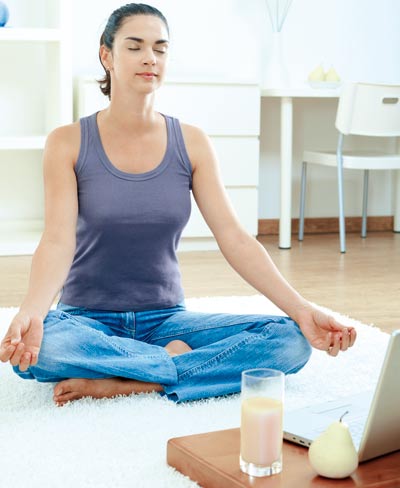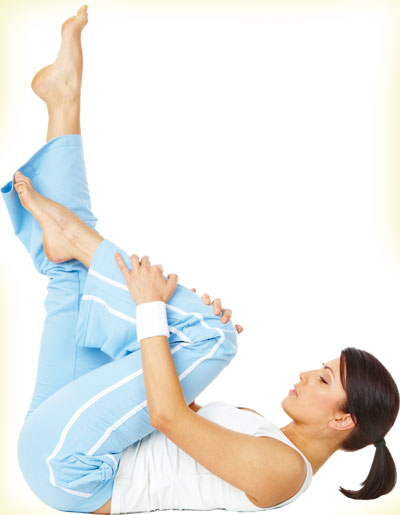It seems as if listening has become a lost art. Certainly, with all the distractions bombarding us at any given moment, it is almost impossible to give anything or anyone our undivided attention. Mastery eludes those with an inability to focus. Unfortunately, when it comes to our inability to focus on listening, we miss out on being masters of our relationships. This not only includes the relationships with our spouse, kids, and co-workers, but also includes our relationship with our own bodies.
Just as our family life suffers when we ignore our spouse and children, our health suffers when we ignore our body. Our body is an amazing system with superior intelligence and it has a lot to say. The problem is that we are generally so busy being busy that we just don’t listen, the results of which can be disastrous for our health.
A million messages…
One reason listening to your body seems so elusive is precisely because it has so much to say. At any given moment, your body receives millions and millions of data bytes from all of your sense organs.
It not only includes your eyes and ears, but also information from your skin, internal organs and a host of other bodily systems… too numerous to list. The tsunami of data that your body collects in a day would probably overload all of Google’s servers. There’s so much data that your brain has dedicated a separate processor just to handle it all.
The awareness processor
This processor is a spot in your brain pressed against your skull right behind your forehead directly between your eyeballs, only slightly higher. Called the ventromedial prefrontal cortex [VMPFC], it is responsible for our embodied self-awareness—our perception of all the bodily information.
Alan Fogel, the author of The Psychophysiology of Self-Awareness: Rediscovering the Lost Art of Body Sense describes embodied self-awareness as “the ability to pay attention to ourselves, to feel our sensations, emotions, and movements” within the present moment.
While we may have a dedicated processor for our embodied self-awareness, the VMPFC has a bit of competition.
Twist in the story
There is another processor that sits right on top of the VMPFC. It is called the dorsomedial prefrontal cortex [DMPFC]. The DMPFC is in charge of handling our conceptual self-awareness, which involves more abstract judgments and assessments about ourselves. When our conceptual self-awareness dominates, it can trick us into thinking that what we are feeling emotionally is actually what our body is experiencing physically.
For instance, that second helping of dessert or the intoxication of too much wine may seem to “feel good” to our body. But it really only satisfies the conceptual awareness of the DMPFC.
An overactive DMPFC can lead us to make choices that are not good for our overall health. When we work too hard, become self-sacrificing people pleasers, eat too much, lie around on the couch, or engage in a host of other addictive behaviours, we may become model employees, good buddies or a lot of fun at parties, but our body pays a huge price [thanks to DMPFC].
Also, at any given moment, we can either listen to the VMPFC [embodied self-awareness processor] or the DMPFC [conceptual self-awareness processor], but not to both at the same time. So, when the DMPFC is active, the VMPFC gets ignored. And when we ignore our embodied self-awareness processor, our relationship with our body [and our health] really suffers.
Reconnecting with your body
 You can mend this relationship simply by tuning out some of the static and listening to what your body is actually saying. This may be difficult at first, but it gets better with practice and time.
You can mend this relationship simply by tuning out some of the static and listening to what your body is actually saying. This may be difficult at first, but it gets better with practice and time.
Further, as you listen to your body, you may discover that your body is actually pretty angry with you. And you may not like what it has to say—it may begin sending you all kinds of uncomfortable messages like: “we are working too hard” [fatigue, joint and muscle pain], or “we are eating too much” [bloating, reflux, nausea], or “we have had enough alcohol” [headache, dizziness, numbness].
It may even get really nasty and some of the emotions that were hiding behind these behaviours like disappointment, grief, anger, despair and loneliness may rise to the surface.
Do not despair. As you begin to listen and respond to the messages your body sends, you can expect to start feeling a whole lot better. Not only that, but the more you listen to your body, the listening also becomes easier. And once you and your body get to know each other again, things will smooth out.
Listening helps
With the assistance of imaging technology that allows reading brain activity and recording brain growth, neuroscientists are now convinced that the brain grows like a muscle. In other words, the more you use it, the stronger it gets. This suggests that the more you listen to your body, the stronger your embodied self-awareness processor [VMPFC] will get.
This is a very good thing because the VMPFC maintains two-way communication with the rest of your brain.
Thanks to this communication, the VMPFC can facilitate active neurochemical and neurohormonal changes in the body’s tissues including the sensory receptors in our muscles, skin, gut, and cardiovascular system.
As a result, the simple act of listening to your body creates physiological changes that will enhance cellular healing and make healthy behavioural choices easier.
A study by the California Institute of Technology [Caltech] too supports this. Caltech scientists observed that people with a more active VMPFC seem to make healthier food choices. In the study published in the Journal of Science [May 2009], researchers noticed that when people chose foods based on nutritional quality and perceived health benefits, regardless of taste, their VMPFC literally became alive with activity. In contrast, people who chose food based entirely on how it tasted, had a quiet VMPFC.
Our body has a lot to say. The problem is that we are so busy being busy that we just don’t listen, the results of which can be disastrous for our health
Awareness affects choice
Not only do those who listen to their bodies make better food choices, but they also eat less and hence are less prone to obesity. Brian Wansink, the author of Mindless Eating, found in a study he conducted that people with normal body weight listened to their body for signals to stop eating—they generally stopped eating when they started feeling full or when the food no longer tasted as good. They also refrained from eating more when they wanted to leave room for dessert.
Those who were overweight, on the other hand, ignored these messages and tended to rely more on external cues to stop eating—they continued to eat until there was no more food, the people around them finished eating, they ran out of a beverage or the TV show they were watching was over.
Improved awareness, improved health
Another study published in Qualitative Health Research examined the health benefits of a special 12-week yoga programme. Based on the reports of the participants, the programme appeared to encourage a healthy reconnection to food, as well as the development of physical self-empowerment by cultivating the ability to be present in the moment. They also reported eating less, eating slower, making better food choices and generally feeling more positive about themselves and their physical
well-being.
Oddly, the programme was not that strenuous and had nothing to do with food. According to the researchers, “There was a deliberate effort to not offer any information regarding the selection of foods, dietary advice or any discussion concerning weight loss.” The primary aim of the yoga programme was to encourage the participants to “develop a daily yoga practice in three distinct, yet overlapping domains: physical awareness through movement and stillness [asana], breath awareness [pranayama], and concentrative meditation [dharana and dhyana]. The latter domain included meditation instructions for eating mindfully.” By concentrating on listening to their bodies, participants experienced that the relationship between them and their bodies began to heal and they felt great.
Exercise improves awareness
 The truth is most of us are already aware that exercise of any kind is good for us. Simply getting your blood pumping will help your body’s immune system, build your heart muscle, strengthen your lungs, help you look and feel younger, flush toxins out of your system and, of course, keep the pounds from piling on. But, did you know something as simple as a regular brisk walk can also can make you less depressed, improve attention deficits, decrease aggressive tendencies and make you smarter? Yes, simple exercise can help build your brain. In his book, Spark: The Revolutionary New Science of Exercise and the Brain, John Ratey, an associate professor of psychiatry at Harvard Medical School, says that exercise stimulates our grey matter to grow. “I can’t understate how important regular exercise is in improving the function and performance of the brain,” he says. “It’s such a wonderful medicine.”
The truth is most of us are already aware that exercise of any kind is good for us. Simply getting your blood pumping will help your body’s immune system, build your heart muscle, strengthen your lungs, help you look and feel younger, flush toxins out of your system and, of course, keep the pounds from piling on. But, did you know something as simple as a regular brisk walk can also can make you less depressed, improve attention deficits, decrease aggressive tendencies and make you smarter? Yes, simple exercise can help build your brain. In his book, Spark: The Revolutionary New Science of Exercise and the Brain, John Ratey, an associate professor of psychiatry at Harvard Medical School, says that exercise stimulates our grey matter to grow. “I can’t understate how important regular exercise is in improving the function and performance of the brain,” he says. “It’s such a wonderful medicine.”
Based on the evidence that exercise grows the entire brain, it is fair to assume that the VMPFC grows too, which would lead to an enhanced ability to listen to your body. This is, in fact, true. According to an article published in the Journal of Health Psychology, researchers at the University of Florida found that when subjects engaged in any exercise, they experienced increased positive feelings about their body image. What was particularly interesting was that the subjects reported this improved relationship with their bodies even before they felt that the exercise was improving their fitness.
As you listen to your body, you may discover that your body is actually pretty angry with you
Awareness gets better results
Even more encouraging is the notion that physical performance can be enhanced by actively listening to your body while you exercise. Based on a study published in the Journal of Sports Sciences, runners who scored highest on tests designed to evaluate ability to listen to their bodies, used less oxygen, ran faster, and tended to have the lowest muscle tension.
The evidence clearly shows that both athletes and non-athletes can improve their performance by learning to pay attention to their bodies. For instance, balance and movement exercises for the elderly appear more effective when they include body awareness training. An emerging body of research is proving that when older adults engage in awareness-focused activities like T’ai Chi or yoga, they demonstrate improved coordination and balance and lesser risk for falls as compared to people who focused only on building muscle strength.
It is hard to deny that actively listening to your body during exercise enhances its benefits. When you exercise, you activate and build neural networks that link the brain to the body and when you listen to your body, you also enhance those same connections. When you do them both together, the results are astounding! Imagine that while you are taking a brisk walk, you are sensing deeply into your body.
Imagine how great it would feel to feel your breath, heart rate, temperature, movement trajectories, environment, as well as muscle tension, pain, and even the peaceful relaxation often experienced while walking. It might mean that you will have to get rid of that MP3 player or video screen, and simply listen. And if you do, you may begin to develop a whole new relationship with yourself.
Listening helps your doctor help you

Another benefit of listening to your body is that you can help your healer. As a physical therapist, I am constantly challenged by people who just don’t listen to their bodies. When I ask how they feel, they simply reply, “terrible” or “great.” Either way, that information alone does not help me to understand the true value of my treatments. To be an effective healer, I need to know what their bodies are telling them.
Don’t get me wrong, I use literally all of my senses to “listen” to the bodies of my patients when I am treating. The problem is that I simply could never listen as well as they could. Not only do they have the advantage of all that wonderful sensory input, but they are also with their own bodies every minute of every day; I only get 30 – 40 minutes with them. After over 20 years of working to heal people, I have found that the people I can most help are those who are able to listen to what their bodies have to say.
It’s important to feel
Among other things, I am also a sailing instructor. What I noticed is that some people are natural sailors, while others are not. Oddly, some of the smartest people appear to be hopeless landlubbers. Local legend has it that Albert Einstein used to spend his summers in our town. The legend also asserts that every time he went sailing, he needed to be towed home. Sailing is a feeling sport; you can’t just think your way home.
To be a great sailor, you need to see the wind and feel the wind. You need to see the sea and feel the sea. To get the most out of sailing [and life in general] you need to feel everything—in the moment—with your entire body.
Making a start
So, how can you get started? I am a big fan of meditating while I exercise. I broke the habit of watching DVDs when I exercise and I simply pay attention to my breathing. In fact, I don’t even time my workouts anymore. I simply exercise for about 400 deep, controlled breaths. This way, my body gets to decide how long we exercise, which is usually between 45 minutes and an hour. No matter how long it is, I feel refreshed and ready to go when I am done.
If you are not quite up to meditating while exercising, how about trying meditation alone. Take five minutes a day to sit in a quiet place and listen to your body. Listen to how your clothes feel on your skin, the wind on your face, the temperature of the environment. If you are feeling it, it is worth listening to.
I am also a big advocate of breathing exercises as a path to bodily awareness. We cannot live without pure, clean, air for more than a few moments. Oxygen is truly our most essential nutrient. Discovering better ways to feel your nourishing breaths is a great way to start healing your relationship with your body.
Training your ear
I also believe in yoga, T’ai Chi, NIA [A blend of T’ai Chi, Tae Kwon Do, Aikido, Jazz dance, Modern dance, Duncan dance, yoga, Alexander technique and the teachings of Moshe Feldenkrais®], ZUMBA [fitness programme based on Latin rhythms] and just about anything else you do that gives your body a chance to express itself. I love kayaking, rock climbing, sailing, horseback riding, hiking and mountain biking. Honestly, it does not matter what you do, as long as you do something you [and your body] enjoy.
There are also some terrific body awareness-based psychological treatment techniques you can try like somatic psychotherapy and somatic experiencing, as well as awareness-based bodywork treatments like Rosen Method Bodywork and the Feldenkrais Method.
No matter what you do, if you listen to your body while you are doing it, I guarantee your relationship with one another will improve as will your overall health and happiness.
 Spot an error in this article? A typo maybe? Or an incorrect source? Let us know!
Spot an error in this article? A typo maybe? Or an incorrect source? Let us know!
